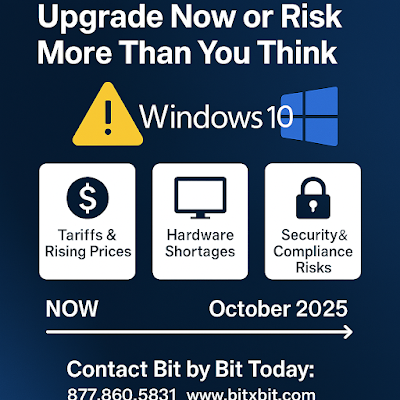If your current IT support feels more like a necessary evil than a trusted partner, it might be time to rethink your strategy.
Do any of these sound familiar?
You wait too long for a response when something breaks.
You get technical jargon instead of clear answers.
Your provider fixes problems but never helps prevent them.
You’re unsure if your systems meet today’s security or compliance standards.
Technology should drive your business forward — not slow it down. When IT is handled reactively, issues keep piling up and opportunities slip away. What you need is a team that looks ahead, safeguards your data, and helps your organization run smarter and more efficiently.
A Better Kind of IT Partner
At Bit by Bit Computer Consulting, we don’t just manage technology — we empower businesses to operate with confidence. Our team takes pride in being responsive, reliable, and proactive every step of the way.
Here’s what working with us looks like:
Quick, professional response whenever you need support.
Strategic planning that aligns IT with your business goals.
Compliance-driven solutions built to meet industry standards like HIPAA, FINRA, and PCI.
Ongoing monitoring and protection to keep systems secure and productive.
Friendly, local experts who take the time to understand how your team works.
Plan Smarter for 2026 and Beyond
Forward-thinking organizations are already preparing for the year ahead — upgrading their systems, tightening security, and improving efficiency. A clear technology roadmap gives you control over costs, reduces risk, and ensures your IT investments actually support growth.
Bit by Bit can help you:
Build a secure, compliant infrastructure
Eliminate hidden IT costs and downtime
Streamline collaboration and remote work
Turn unpredictable expenses into a reliable monthly plan
Transition Without the Headache
Switching IT providers doesn’t have to be painful. Our onboarding process is organized, transparent, and handled with care — so you can focus on your business while we take care of the technology.
Because at Bit by Bit, we believe every organization deserves trusted IT support that actually cares — the kind that listens, responds, and helps your people succeed every day.
Ready to experience the difference?
Let’s build your IT strategy for the future.
📞 877.860.5831 | 🌐 www.bitxbit.com















